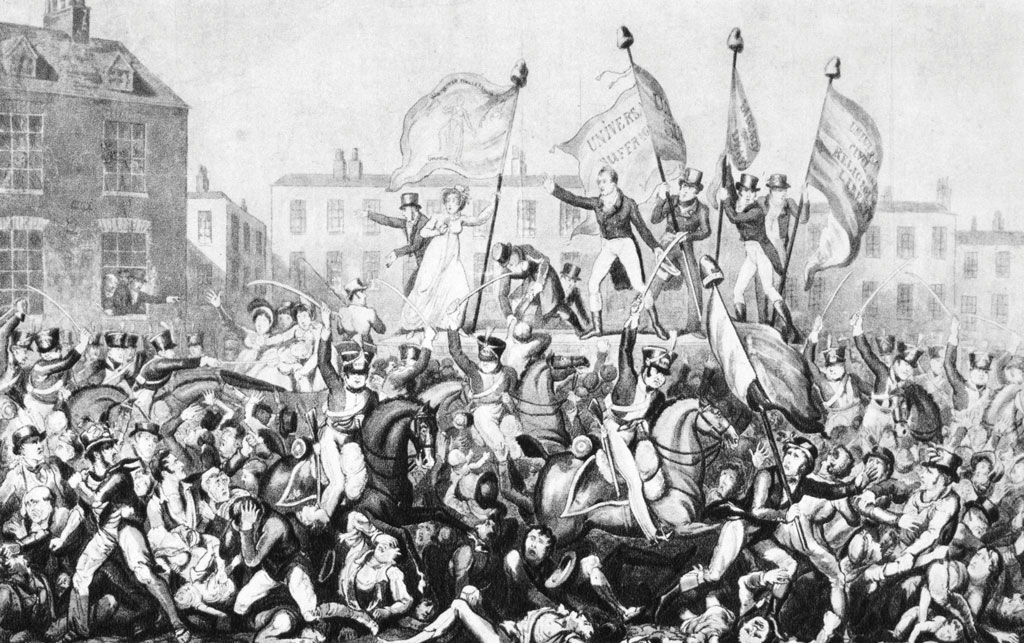
In another time of political tension, Geoffrey Bindman recalls a historic tragedy
On 20 October 2018, 600,000 people marched down Whitehall to demand a second referendum on Brexit. None were arrested and none were hurt. On 16 August 1819 about 60,000 gathered in St Peter’s Fields in the centre of Manchester to demand the vote. Soldiers brandishing sabres rode their horses at the crowd, leaving 17 citizens— men, women and children—dead, and about 500 more injured. The anniversary of this tragedy is commemorated by a film directed by Mike Leigh, highlighting the violence and drama of the event, and depicting much of the political and social background. The law receives less vivid cinematic attention. Yet the law had a vital role at Peterloo and in the events that followed it.
Industrial revolution
Waterloo had ended the Napoleonic Wars in 1815 and brought back the soldiers who survived them. Some remained in much diminished military units. Most were thrown onto a scarce jobs market. Traditional crafts and skills were being replaced by technological advances. Earlier, while the wars were still going on, the new textile machines and their owners were attacked by the newly unemployed. A ruthless government suppressed these ‘Luddites’ (see my article ‘Lessons from the Luddites’ 167 NLJ 7754, p22) but by 1819 textile manufacture was booming. The new source of popular discontent was the exploitation of the disenfranchised workers now employed to operate the machines in ‘dark satanic mills’—as William Blake described them. Factory workers, including children, were forced to work long hours for meagre wages. Government was in the hands of a land-owning aristocracy answerable to a parliament virtually of their own choosing. Manchester, with a population in 1819 of half a million, had no elected representative at Westminster.
Public order
The right of assembly and peaceful protest for all citizens had long been recognised—at least in the negative sense that the law did not restrict it—but there were no effective means of maintaining public order until the development of the current network of police forces. At the time of Peterloo about a dozen magistrates appointed from local businessmen and clergy constituted the bench at the Manchester Quarter Sessions. In their peacekeeping role they were aided by a largely untrained group of watchmen. The legendary ineptitude of all these had been brilliantly caricatured by Shakespeare in Henry IV Part 2. The Manchester team matched his stage army.
In a dire emergency the magistrates could call on the help of the military, but only after complying with the requirements of the Riot Act 1714. The magistrates had to read a proclamation in the language of the statute ordering the dispersal of those assembled. Failure to disperse within one hour was an offence punishable by death. The magistrates could call on the army to enforce their order. The statute indemnified those assisting in the dispersal from all liability.
Reading the Riot Act
The Manchester magistrates took fright at the prospect of what they wrongly believed was planned as a violent demonstration. They read the Riot Act and called for help from the nearest army units: the local Manchester Yeomanry and other units controlled by the military commander of the region, Lieutenant General Sir John Byng. He himself chose not to turn up, preferring to attend a race meeting at York. He sent an inexperienced deputy, Colonel L’Estrange. The crowd was waiting peacefully for the speeches to begin, especially that of the great democratic campaigner Henry ‘Orator’ Hunt, who had travelled from London for the event. Without waiting for the meeting to start, the colonel ordered his cavalry to charge at the crowd, brandishing their sabres. The appalling scene that followed is depicted with breathtaking realism in Mike Leigh’s film and it is a fitting climax to a gripping narrative. But the political and legal repercussions were in the hands of the authoritarian government of Lord Liverpool and its notoriously rigid Home Secretary Lord Sidmouth. How would these terrible and unnecessary wrongs to innocent citizens be redressed? What steps would be taken to ensure that such tragedies could not be repeated?
Sidmouth’s shameful answer was punishment not of the attackers but of the attacked. Hunt and the meeting’s organisers were arrested and indicted on charges of conspiracy and unlawful assembly. Hunt was convicted and imprisoned for two years. The government hoped to place full responsibility on the protestors. However, another legal resource came into play. A victim, John Lees who had been severely injured in the attack died soon after and an inquest was held at Oldham. A sympathetic coroner allowed the full story of the massacre to be exposed. A procession of witnesses gave graphic accounts of their terrifying experiences, fully reported in the press.
The government’s response was yet more action to suppress public protest. Before the end of 1819 Sidmouth had introduced the notorious Six Acts, prohibiting public gatherings of more than 50 people, increasing powers of search, and seizure of newspapers and pamphlets, and curtailing the alarming emergence of political activity among the working classes.
Comment
Eventually, of course the Peterloo protesters achieved their objective of an extended franchise, and governments have learned to manage public order without resort to the lethal violence of Peterloo. The Riot Act was repealed in 1973. But the temptation of too heavy-handed policing of legitimate protest is always there. Eternal vigilance remains the price of freedom.
Sir Geoffrey Bindman QC , NLJ columnist & consultant, Bindmans LLP.
© Granger/REX/Shutterstock











